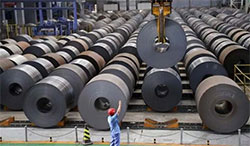Important Topics for UPSC 2017 Exams (Anti-Dumping Duty)
Important Topics for UPSC 2017 Exams (Anti-Dumping Duty)
 What?
What?
A penalty is imposed on questionably low-priced imports, to escalate their price in the importing country and therefore to protect domestic industry from unfair competition.
Why?
- Because, to rectify the trade distortion effect of dumping and re-establish fair trade.
- WTO under the GATT (General Agreement on Tariff and Trade) allow their member countries to take specific decision on imposing such anti-dumping duty to ensure fair trade rather than protecting domestic industry.
Example:
Steel sector in India was facing severe loss for past 3-4 years due to very low price imports from china. Prices of steel plummeted in the international market due to lower demand and excess capacity of Chinese steel manufacturers. Scenario was such bad that many steel companies across the globe including India were facing huge economic loss and even some defaulting cases in India.
Further, reason for such a low steel prices was found out to be over subsidised production in china. Therefore to counter such predatory pricing many countries including India has adopted the Anti-dumping duty therefore raising the cost of import and therefore the final prices. The result of which seems effective from the recent quarter results of steel companies where most of them either government controlled (SAIL) or public limited companies (Tata Steel, Jindal etc.) have shown huge profits and reversal of economic activity.
Impact on Society
- Positive for the sector which was directly suffering for example in the above case steel sector.
- Negative on larger trade relation between the 2 countries involved.
- Positive for the larger economy since one blocked segment may slow the growth wheel.
- Globally it is seen as the last resort to defend local companies and therefore some consider it as a protectionist trade policy by the State.
- The exporting country may use anti- dumping method for the other segment of the importing country and therefore it may result into sour trade relations in the long run.
- Further, some sectors where large labour force is involved is especially protected by the State against any dumping effects.
- For example: Jute sector in India due to socio-economic responsibility of a State towards its citizens.

